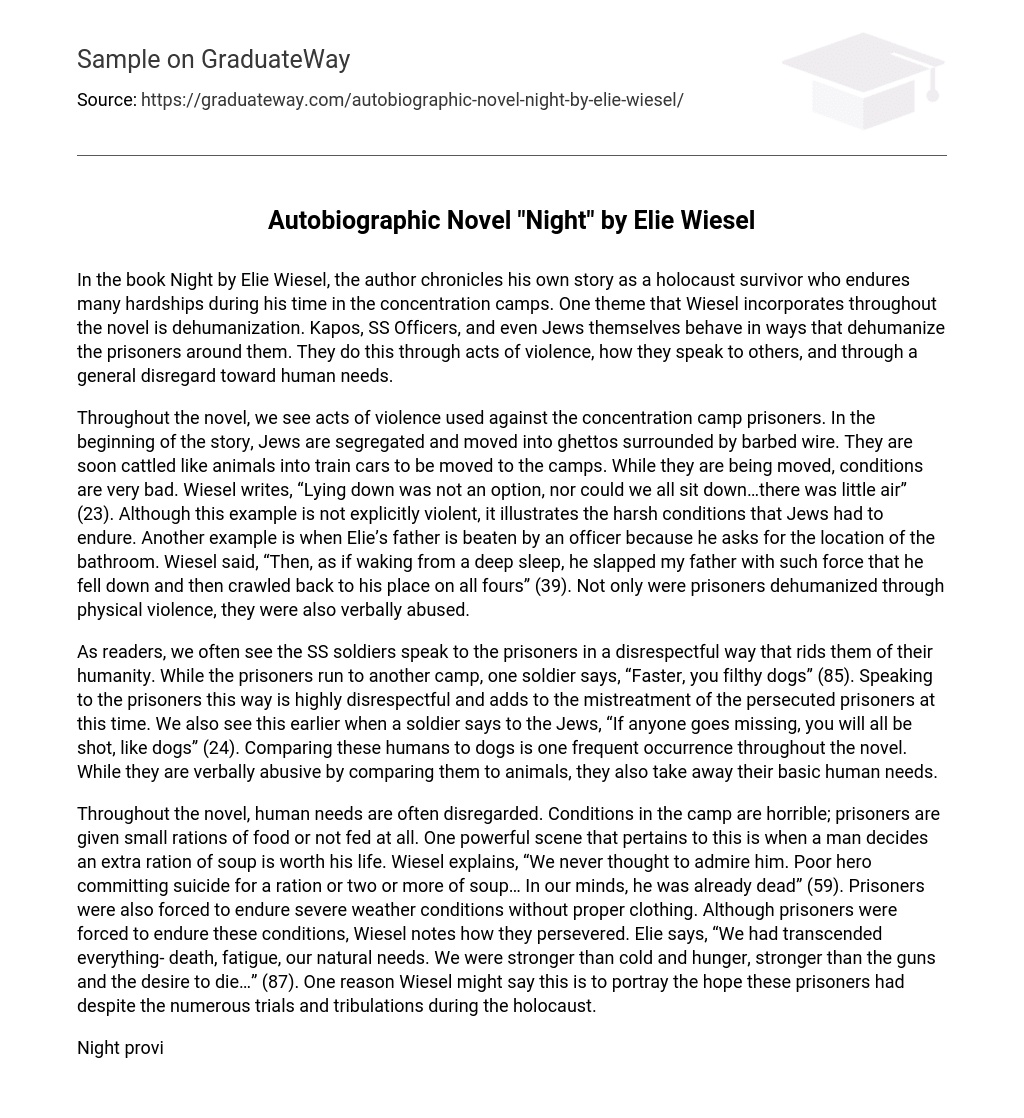In the book Night by Elie Wiesel, the author chronicles his own story as a holocaust survivor who endures many hardships during his time in the concentration camps. One theme that Wiesel incorporates throughout the novel is dehumanization. Kapos, SS Officers, and even Jews themselves behave in ways that dehumanize the prisoners around them. They do this through acts of violence, how they speak to others, and through a general disregard toward human needs.
Throughout the novel, we see acts of violence used against the concentration camp prisoners. In the beginning of the story, Jews are segregated and moved into ghettos surrounded by barbed wire. They are soon cattled like animals into train cars to be moved to the camps. While they are being moved, conditions are very bad. Wiesel writes, “Lying down was not an option, nor could we all sit down…there was little air” (23). Although this example is not explicitly violent, it illustrates the harsh conditions that Jews had to endure. Another example is when Elie’s father is beaten by an officer because he asks for the location of the bathroom. Wiesel said, “Then, as if waking from a deep sleep, he slapped my father with such force that he fell down and then crawled back to his place on all fours” (39). Not only were prisoners dehumanized through physical violence, they were also verbally abused.
As readers, we often see the SS soldiers speak to the prisoners in a disrespectful way that rids them of their humanity. While the prisoners run to another camp, one soldier says, “Faster, you filthy dogs” (85). Speaking to the prisoners this way is highly disrespectful and adds to the mistreatment of the persecuted prisoners at this time. We also see this earlier when a soldier says to the Jews, “If anyone goes missing, you will all be shot, like dogs” (24). Comparing these humans to dogs is one frequent occurrence throughout the novel. While they are verbally abusive by comparing them to animals, they also take away their basic human needs.
Throughout the novel, human needs are often disregarded. Conditions in the camp are horrible; prisoners are given small rations of food or not fed at all. One powerful scene that pertains to this is when a man decides an extra ration of soup is worth his life. Wiesel explains, “We never thought to admire him. Poor hero committing suicide for a ration or two or more of soup… In our minds, he was already dead” (59). Prisoners were also forced to endure severe weather conditions without proper clothing. Although prisoners were forced to endure these conditions, Wiesel notes how they persevered. Elie says, “We had transcended everything- death, fatigue, our natural needs. We were stronger than cold and hunger, stronger than the guns and the desire to die…” (87). One reason Wiesel might say this is to portray the hope these prisoners had despite the numerous trials and tribulations during the holocaust.
Night provides a brilliant perspective of a courageous survivor. Elie Wiesel illustrates his horrifying experience by incorporating a theme of dehumanization throughout the novel. Despite dehumanization in the form of physical violence, verbal abuse, and even a disregard toward basic human need, Wiesel survived the holocaust and can now enlighten us all about the importance of humanity.





